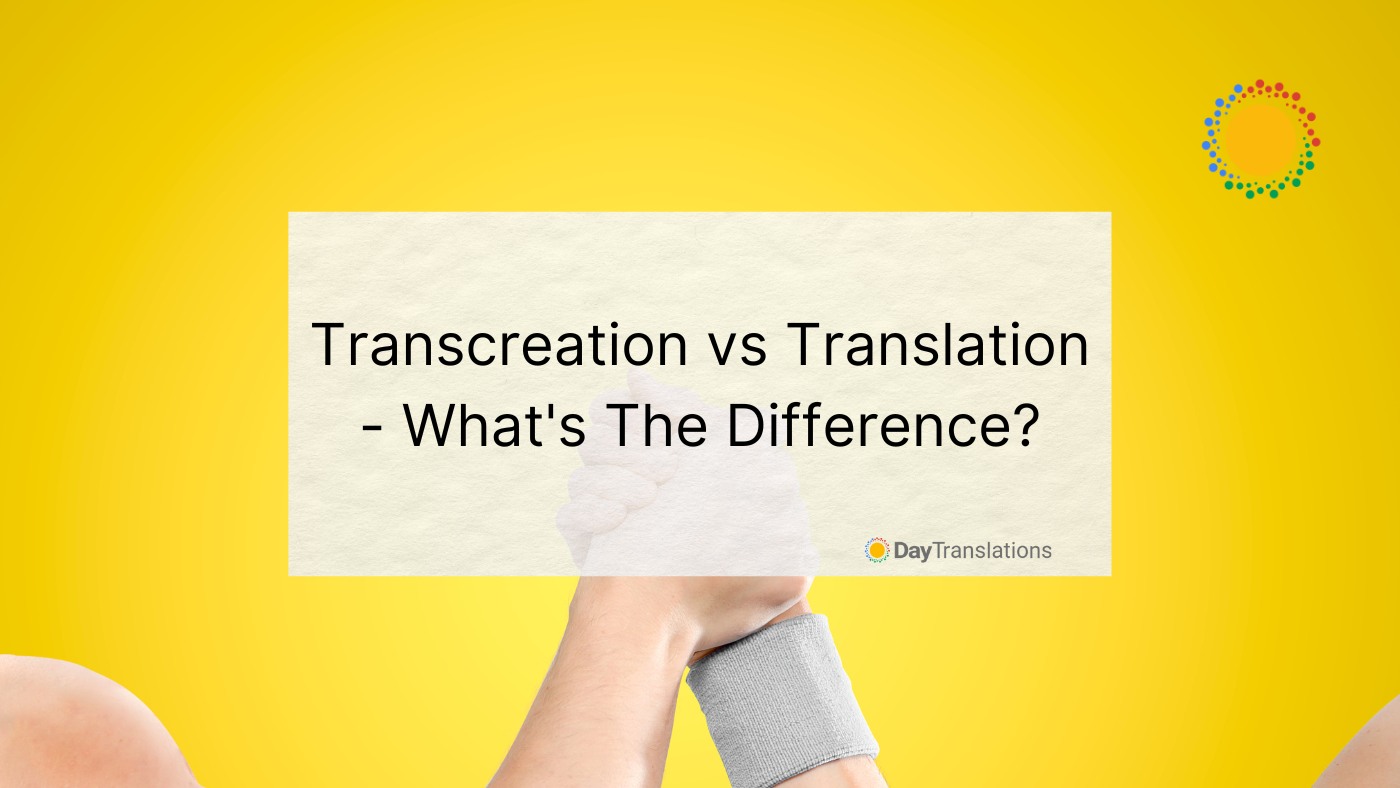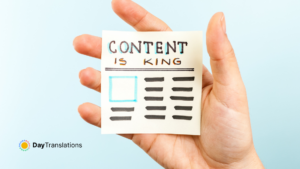Content on a website and marketing texts are all written with the intent to trigger certain reactions or emotions from the reader. However, a marketing text that resonates with readers in one market may miss the spot with potential buyers in another.
Because of this, it is often the case that a business will hire localization providers to translate and craft messages that resonate with a specific audience. These providers often work hard to preserve the style, intent, tone, voice, and context as much as possible.
The term “translation” is an umbrella word that covers a range of services. When specifically applied to marketing, it refers to a globalization of the marketing campaign that includes marketing translation, multimedia localization, transcreation, brand localization and copywriting.
Very often, “transcreation” and “marketing translation” are used interchangeably. But there is a subtle distinction between the two terms. In order to understand what these are, it’s useful to grasp the aims of each service so that they remain clear in your mind when it’s time to request a service involving translation.
What is Transcreation?
Transcreation happens when a highly specialized translator recreates the text in question for a specific audience. The key word here is “recreates,” which otherwise means to reproduce, give new life to, create again, reinvent. It doesn’t refer to creating the content completely from scratch but often changing the source content significantly in the process.
The process of transcreation typically applies to product names, advertisement copy, slogans and taglines, that is, highly branded marketing material. Transcreation can also be used to translate brand and style guidelines as well as creative briefs.
Transcreators are exceptionally creative translators: seasoned and experienced people who aim to create a text in the target language that triggers the same emotions and nail the same marketing objectives as the original content.
Spider Man India
For example, Wikipedia offers a compelling example regarding Spiderman, the comic book character. The creators understood the American Spiderman would not be suitable for the Indian market. So they transcreated a version of the character that is of Indian origin whose secret identity is Pavitr Prabhakar.
Sporting a dhoti, he battles the demon Rahshasa in notable Indian landmarks like the Taj Mahal and has no real connection to New York City. The point of the transcreated character and comic book story line is to have readers identify with Spiderman India so they would purchase more comic books. In other words, transcreators remade and adapted the Spiderman character for the Indian market.
As frequently happens with many transcreation projects, in this example, not much was preserved from the source material. The “essence” of the character was respected, but in many aspects, the character is understood to be a native Indian battling evil in his home country.
Transcreation is often carried out by two, or more, translators and involves a reconciliation process. Constant review and input by the creators of the content are a part of the process.
What is Translation?
Translators continually adapt the message from one language to another, while preserving context, tone, style and intent. This service covers a translation of the text, but changes the humor, idioms, cultural references and slang to resonate with the target foreign audience. The operative word here is “adapt,” not recreate. Adapt is to revamp, adjust, alter and modify. Professional human translation services entail always using the original text as the source, not just as a reference.
Often the translated text does not feature many dramatic changes, so that the end result is frequently a word-for-word translation of the original.
Any text can be translated, but in the realm of marketing, material often translated consists of web content, catalogues, product descriptions, marketing collateral, social media content and video scripts.
How Are They Similar?
Both translation and transcreation involve creativity. The translation of marketing copy is particularly creative. Because the latter material aims to persuade the reader to be interested in the product, to purchase the product, and even recommend and develop a loyalty to the product, the material – both source and translated – has to be compelling and of high creative quality.
The two terms also refer to transforming the original communication so that it addresses the target readership. In both services, the translator or transcreator must have ample skills and follow any creative or branding guideline.
The two services are undertaken by:
- Bilingual linguists who are specialists in the topic
- Bi-cultural people who understand source text concepts and what the parallel is for the target market
- Have solid writing skills on top of their translation skills
- Are fundamentally creative people who are confident making decisions on how to interpret the brand as they work on the piece
At the same time, transcreators typically have more experience and seniority than translators, because they have a greater responsibility to honoring the spirit of the text. They also tend to have free creative license to recreate the core concept in the target language.
Brands seeking for international expansion use transcreation, re-creating their marketing and advertising campaigns to fit into new markets, cultures and languages. Know more in our free guide to marketing and transcreation.
How To Tell Which Service You Should Spring For
All translations are usually direct and straightforward. Transcreation, in turn, is similar to copywriting. Both services fall between word-for-word translation on one end of the spectrum and creative, from-scratch, content creation with no source text as reference, on the other end of the same spectrum. If confused as to which service you should request, your translation provider will guide you.












narwhal onesie
Posted at 10:10h, 06 SeptemberI want to to thank you for this fantastic read!! I certainly loved every little bit of it. I have got you book marked to check out new stuff you post…
lashes extension
Posted at 23:28h, 07 SeptemberExcellent post. I’m dealing with some of these issues as well..
plus size onesie 3x
Posted at 04:09h, 11 SeptemberExcellent way of telling, and fastidious article to obtain facts about my presentation subject, which i am going to present in academy.